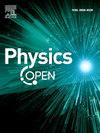Constraining f(R) gravity model through Hubble Parametrization
IF 1.4
Q2 Physics and Astronomy
引用次数: 0
Abstract
In this work, we explore a modified theory of gravity by transitioning from standard General Relativity(GR) to an f(R) gravity framework wherein the Ricci scalar is replaced by a general function . By adopting a specific Hubble parameterization , where is the present value of Hubble parameter and be the free model parameter. We investigate the dynamical evolution of the universe under this modified gravity scenario with quadratic equation of state(EoS), . The Raychaudhuri Equation is employed to analyze the focus of geodesics and provide insights into the expansion behavior of the model universe, allowing us to track deviations from the standard cosmological model. To assess the viability of our f(R) gravity model, we analyze 46 Hubble parameter observations using the Markov Chain Monte Carlo(MCMC) technique to constrain cosmological parameters. We further use the 1048 Pantheon dataset of Type Ia supernovae to enhance the statistical robustness and tighten constraints. The combined observational analysis supports the model as a viable alternative to the standard CDM framework, particularly in explaining late-time cosmic acceleration. Notably the model exhibits deviations at higher redshifts that suggest new insights into cosmic evolution. The study also develops a neural network-based machine learning model to predict the Hubble parameter H(z) across various redshifts, facilitating data-driven insights into cosmic expansion.
通过哈勃参数化约束f(R)引力模型
在这项工作中,我们通过从标准广义相对论(GR)过渡到f(R)重力框架来探索一个修正的引力理论,其中里奇标量R被一般函数f(R)=R+αR2取代。通过采用特定的哈勃参数化H(z)=H021+(1+z)2(1+ζ)12,其中H0为哈勃参数的现值,ζ为自由模型参数。利用二次态方程(EoS), p=μρ2−ρ,研究了这种修正重力情景下宇宙的动力学演化。Raychaudhuri方程用于分析测地线的焦点,并提供对模型宇宙膨胀行为的见解,使我们能够跟踪与标准宇宙学模型的偏差。为了评估我们的f(R)引力模型的可行性,我们使用马尔可夫链蒙特卡罗(MCMC)技术来约束宇宙学参数,分析了46个哈勃参数观测结果。我们进一步使用1048 Pantheon的Ia型超新星数据集来增强统计鲁棒性并收紧约束。综合观测分析支持该模型作为标准ΛCDM框架的可行替代方案,特别是在解释晚时间宇宙加速方面。值得注意的是,该模型在较高的红移处显示出偏差,这为宇宙演化提供了新的见解。该研究还开发了一种基于神经网络的机器学习模型,用于预测各种红移的哈勃参数H(z),从而促进对宇宙膨胀的数据驱动见解。
本文章由计算机程序翻译,如有差异,请以英文原文为准。
求助全文
约1分钟内获得全文
求助全文
来源期刊

Physics Open
Physics and Astronomy-Physics and Astronomy (all)
CiteScore
3.20
自引率
0.00%
发文量
19
审稿时长
9 weeks
 求助内容:
求助内容: 应助结果提醒方式:
应助结果提醒方式:


